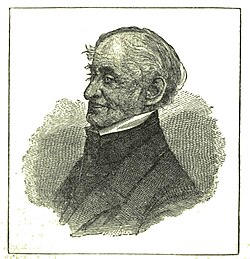for the Munich School of Music,' an English edition of which, by A. Spengel, is now published (London: Forsyth).
When Wüllner succeeded Bülow at the Court Theatre in 1869, he found himself plunged into personal difficulties of all kinds connected with the production of Wagner's 'Rheingold'; but his tact and ability surmounted all, and the result was an unqualified success. The Rheingold was followed by the 'Walküre,' one of the most brilliant achievements of the Munich stage in modern times, and in 1870 Wüllner was appointed court-Capellmeister in chief. He also succeeded Bülow as conductor of the concerts of the Academy of Music, and carried them on alone till Levi was associated with him in 1872. In 1877 he left Munich,[1] in order to succeed Rietz at Dresden as Capellmeister of the court-theatre, and artist-director of the Conservatorium, and here he remained until called to fill the place of Hiller at Cologne, April 1, 1885.
Wüllner's works include:—'Heinrich der Finkler, cantata for voice and orchestra—first prize at the competition of the Aix-la-Chapelle Liedertafel in 1864; PF. pieces for 2 and 4 hands, and chamber-music; several books of Lieder for single voice; important choral compositions, with and without orchestra, such as masses, motets, Lieder for mixed chorus, a Miserere for double choir, op. 26; Psalm cxxv. for chorus and orchestra, op. 40, etc.; a new arrangement of Weber's 'Oberon,' the additional recitatives being compiled from materials in the opera (the libretto by F. Grandaur of Munich). In this form 'Oberon' has been put on the stage at several of the great German theatres.—His editions of six of Haydn's Symphonies (RieterBiedermann) must not be overlooked. [App. p.817 "Add among his works, a Stabat Mater for chorus."]
WYLDE, Henry, conductor and composer, born in Hertfordshire, 1822: though intended for Holy Orders, had so strong a bent for music, that he was placed at sixteen under Moscheles, and in 1843 became a student at the Royal Academy under Cipriani Potter, of which he afterwards was appointed one of the Professors of Harmony. In 1850 he obtained the degree of Mus. Doc. of Cambridge University. He acted as Juror in the Musical Instrument Section in the International Exhibitions of 1851 and 1862, and in 1863 was elected Professor of Music at Gresham College, London. In 1852 the New Philharmonic Society was founded by Sir Charles Fox, and others, on the advice of Dr. Wylde. [See New Philharmonic Society, vol. ii. p. 452.] In 1858 he assumed the sole responsibility of the undertaking and conducted its annual series of concerts till 1879. Dr. Wylde founded the London Academy of Music, and built St. George's Hall, Langham Place, for its purposes, which was opened in the summer of 1867. The London Academy has since opened branch establishments at South Kensington and Brighton. Dr. Wylde's musical compositions include a setting of Milton's Paradise Lost for solos, chorus and orchestra, performed by the New Philharmonic Society, May 11, 1853, and May 1, 1854; and a Cantata 'Prayer and Praise' for the same; selection performed, June 9, 1852; Pianoforte Concerto in F minor performed April 14, 1852; Pianoforte Sonatas; a 'Rhapsodie for piano' (op. 2); Fantasia sur un air favori (op. 6); English songs from Goethe and Schiller; English songs, 'The Sea Nymphs,' vocal duet, etc. Dr. Wylde is also the author of 'The Science of Music,' 'Modern Counterpoint,' 'Music in its Art Mysteries.' Mr. John Francis Barnett, the composer, and teacher of piano at the Royal College of Music, was a pupil of Dr. Wylde's.
- ↑ The University conferred on him the honorary degree of Doctor.

